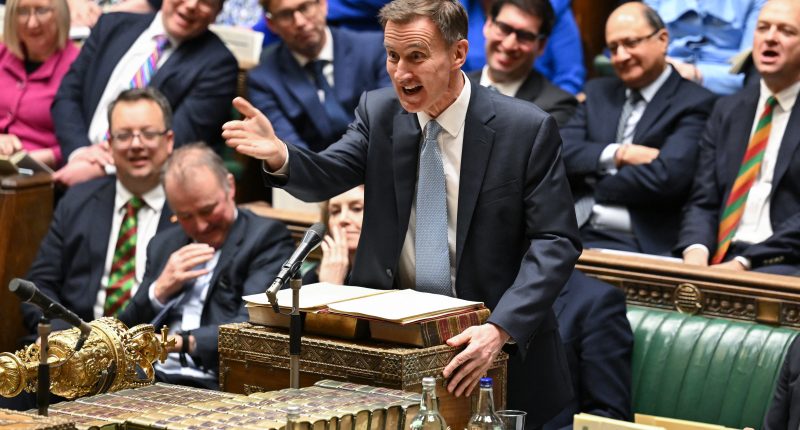MORE than 27 million workers are in line for a £450 wage boost thanks to a fresh National Insurance cut.
The 2p reduction has been confirmed by The Chancellor in today’s Spring Budget and will come into effect in just weeks.
The change means that someone earning an average salary of £35,000 will save more than £448.60 a year.
This increases to a maximum of around £750 for those on salaries above £50,000.
The legislation is being brought in next week to enable the cut to come in from April 6 – the start of the next tax year.
Jeremy Hunt‘s announcement, which outlines the financial plan for the rest of the year, also includes tax hikes and benefit increases.
READ MORE SPRING BUDGET
Spring Budget at a glance
Two million self-employed people will see the main rate of National Insurance slashed from 8% to 6%, working out at an average saving of £350 a year.
Speaking in the House of Commons, Mr Hunt said: “From April 6, employees National Insurance will be cut by another 2p, from 10% to 8%.
“And self-employed national insurance will be cut from 8% to 6%.
“It means an additional £450 a year for the average employee or £350 for someone self-employed.”
Most read in Money
Combined with the two percentage points cut to NI that came into effect in January, this will be a total saving of around £900 a year.
The chancellor added: “When combined with the autumn reductions, it means 27million employees will get an average tax cut of £900 a year and two million self-employed a tax cut averaging £650.
“Changes that make our system simpler and fairer. And changes that grow our economy by rewarding work.”
Those who are self-employed will benefit from a 1% cut to NI as well as the abolition of Class 2 National Insurance, which will also come into effect in April.
National Insurance is a tax on your earnings that goes towards state benefits like state pension, statutory sick pay, maternity leave and unemployment benefits.
It comes after speculation had been rising in recent weeks that Mr Hunt would make NI or Income Tax cuts.
Brian Byrnes, head of personal finance at Moneybox, said: “More money in consumer’s pockets will always be welcome news and the cut to National Insurance today has the potential to make a meaningful difference if the money is put to good use.”
The Chancellor has been under pressure to press ahead with sizable giveaways in the Budget in a bid to get Britain growing.
The giveaway could have come as a cut to Income Tax, but The Chancellor has opted to slash NI instead.
The announcement today does mean though that pensioners will miss out on any savings because NI is not paid by those over the state pension age, which is currently 66.
Becky O’Connor, director of public affairs at PensionBee, said: “Pensioners would have benefited more from either an increase in the personal tax allowance, as state pension increases continue to drag more over this threshold, or a cut to income tax, which they pay on pension income.”
But finance experts and economists have previously warned that frozen income tax thresholds, which have been pushing people into higher tax brackets, will offset the NI boost for many people.
Sean Cockburn, tax director at Mazars, said: “While this is good news, there were glaring omissions.
“No news on income tax thresholds means that the sting of higher rate tax brackets will continue to pain workers, with many more dragged in, and there was no mention of personal allowance thresholds.
“This could have been the Budget that was used to simplify the tax system.”
What is National Insurance?
National Insurance is a tax on your earnings, which is put into a fund to use for some state benefits.
This includes the state pension, statutory sick pay, maternity leave and unemployment benefits.
If you are a UK national, you should receive an NI number and card before you turn 16, but you may have to apply.
This number allows the government to track your earnings and apply the right amount of tax.
Who pays National Insurance?
You pay National Insurance if you’re 16 or over and either:
- An employee earning above £242 a week
- Self-employed and making a profit of more than £12,570 a year
It is deducted from your wages each month.
If you’re employed, you can see your contributions by looking at your pay slip.
Once you reach state pension age, you don’t need to pay it at all.
There are different types of National Insurance, known as “classes”, and the type you pay depends on your employment status, how much you earn, and whether you have any gaps in your National Insurance record.
What are the NIC thresholds and how much do I pay?
The threshold for NI payments is currently £12,570 a year for employed workers.
If you are employed, you start paying NI when you are 16 or older.
Most people now pay 10% NICs on any earnings between £242 and £967 a week.
Plus you have to pay 2% on anything you earn over £967 a week – or £4,189 per month.
Those earning less than these amounts do not have to pay any National Insurance.
The self-employed start paying when they make profits of at least £12,570 a year.
READ MORE SUN STORIES
If you’re self-employed you need to complete a self-assessment tax return and pay NICs and income tax yourself.
The exact amount you pay will depend on how much you earn as it’s a percentage of earnings between these amounts.
Do you have a money problem that needs sorting? Get in touch by emailing [email protected].
Plus, you can join our Sun Money Chats and Tips Facebook group to share your tips and stories.











